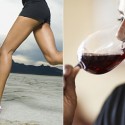Doctors to treat alcoholics with taste of The Good Life
Successfully persuading chronic alcoholics of the virtues of gardening and a good diet may appear like an impossible task, but doctors are to start promoting The Good Life model in a bid to cure Scotland’s drink problem.
Teaching problem drinkers how to grow and cook healthy food is to be a key part of a drive across Glasgow that aims to prevent booze-related brain damage by encouraging alcoholics to eat “three square meals a day”.
Given the chaotic nature of alcoholics’ lifestyles, experts have questioned whether such an approach would be successful.
But NHS Greater Glasgow and Clyde’s Addiction Services unit believes that the new approach can encourage alcoholics to eat food that is rich in thiamine or Vitamin B1, which can delay or prevent the onset of alcohol-related brain damage.
A greenhouse in the Pollok area of Glasgow has been commandeered by the Glasgow Addiction Service’s “Grow it, Eat it” project.
A small group of problem drinkers have already started tending their plants as part of the project, which is believed to be the first of its type. If successful, it is likely to be introduced elsewhere in Scotland.
Cookery classes are to be held in hospitals across the city and a £5,000 leaflet campaign extolling the benefits of a decent diet aims to reach thousands of problem drinkers across the city.
Helen Bennewith, a dietician with the Addiction Service, has also been charged with educating 400 doctors, nurses, occupational therapists and psychologists about the need to persuade their heavy-drinking patients to at least eat healthily.
Researchers are also attempting to develop a simple and quick test that could be used to scan alcoholics and determine whether they are suffering from a thiamine deficiency. Currently, patients have to go to Stobhill Hospital for a blood test, which can take a couple of days before it comes back from the laboratory.
In addition to brain damage, thiamine also protects against other effects of alcohol such as Wernicke-Korsakoff Syndrome, which causes impairment of vision and memory.
Thiamine cannot be stored in the body for long and therefore it is important to get a regular supply. Foods that are rich in thiamine include lean pork, beef, liver, yeast extract, Bovril, peas and beans, bread and nuts.
The leaflets explain the other drastic health effects of drinking alcohol at the expense of eating, including the increased risk of infections, low mood and nausea.
Bennewith said: “Even in those who are still drinking alcohol, a varied diet and eating regularly not only gives vital nutrients but also plays a key part in providing much needed structure in the sometimes chaotic lives of alcohol abusers.
“It also provides opportunities for enjoying the social aspects of eating with friends and family and adds to quality of life. Services have not focused on diet and nutrition to this extent before, but in terms of drug and alcohol abuse it is a key factor and this is now being recognised.”
She added: “Many of our service users not only have poor diets, but also have inadequate cooking skills, low incomes or a lack of knowledge about the importance of good eating habits.”
The leaflets have been produced by an expert group made up of representatives of the Glasgow Addiction Services, the Government-funded Scottish Nutrition and Diet Resources Initiative and other staff from NHS Greater Glasgow and Clyde.
Professor Peter Hayes of the Scottish Liver Transplant Unit based at Edinburgh Royal Infirmary, said: “I suppose this would kill two birds with one stone. Some people turn to drink through loneliness and boredom. Getting them out into the garden would perhaps help that. Would this approach actually prevent them from getting disease? I know of no evidence that shows that it does.
“I always have a slight concern that these things are trailed and their assessment is a bit subjective. I suppose it is worth trying to help people, but this sort of approach wouldn’t have leapt out at me. Maybe we should give them more dietary supplements.
“But it sounds like not a bad initiative. It would be interesting to see how effective it is.”
He added: “One of the problems that people who are drinking have is that they don’t look after themselves and don’t eat and they get their calories from alcohol.
“GPs are good at giving alcoholics thiamine tablets, which seems to protect them from more damage.”
source: Scotland On Sunday
